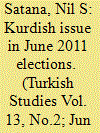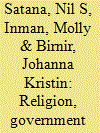|
|
|
Sort Order |
|
|
|
Items / Page
|
|
|
|
|
|
|
| Srl | Item |
| 1 |
ID:
105688


|
|
|
|
|
| Publication |
2011.
|
| Summary/Abstract |
This article seeks to understand the transformation of Turkish civil-military relations in a comparative perspective. The analysis is based on two criteria: institutional/legal mechanisms and political oversight of the military's autonomy. Comparison of European and Middle Eastern civil-military relations models to the Turkish paradigm unveils grave differences between Turkish and Middle Eastern civil-military relations. The Turkish model in transformation for at least a decade is closer to the European model in both legal and political aspects. Nevertheless, the article underscores that Turkish civil-military relations are still in transformation and although the EU accession process has gradually democratized the legal system of the country, democratic consolidation requires further advances in the political domain. Consequently, consolidation in Turkey depends not only on retreating of the military from the political realm but also on the proper civilianization of the regime in theory and practice.
|
|
|
|
|
|
|
|
|
|
|
|
|
|
|
|
| 2 |
ID:
114238


|
|
|
|
|
| Publication |
2012.
|
| Summary/Abstract |
This article analyzes the Kurdish issue in various aspects before the June 2011 elections. The main research questions include what constitutes the major grievances of the Kurds; how the ongoing conflict is framed as "Kurdish issue" versus a "terrorism problem" and how major political parties in Turkey approach the issue and its solution in their 2011 election manifestos and rallies. This article contributes the literature on the Kurdish issue in particular and Turkey's democratic consolidation in general by identifying the problems and political views of all relevant sides. Finally, based on both a historical and empirical analysis, the article reflects on the reasons why the Adalet ve Kalkinma Partisi and Baris ve Demokrasi Partisi have become the major players in addressing the Kurdish issue after the 2011 election. The findings are relevant for Turkish democratic consolidation in particular and the democratization literature in general.
|
|
|
|
|
|
|
|
|
|
|
|
|
|
|
|
| 3 |
ID:
172828


|
|
|
|
|
| Summary/Abstract |
This study examines how military counterterrorism (CT) measures affect the quality of democracy by altering civil–military relations (CMR) and focuses on CMR as the main causal mechanism. We argue that the use of military measures in CT jeopardizes democracy at the societal level by increasing the belief that only the military is equipped to deal with the threat at hand. Therefore, erosions of civil liberties are tolerated in exchange for security. Second, we argue that military CT measures change the balance between the military and civilian executive powers in procedural and liberal democracies. While the military’s executive power increases in procedural democracies, civilian executive power increases and goes unchecked in liberal ones. Case studies of the United States and Turkey show that military CT measures affect CMR in these countries, which generate a similar tradeoff between security and the quality of democracy, albeit via different causal mechanisms. While that tradeoff is less severe in the United States, Turkey is more vulnerable to erosion of democracy.
|
|
|
|
|
|
|
|
|
|
|
|
|
|
|
|
| 4 |
ID:
120318


|
|
|
|
|
| Publication |
2013.
|
| Summary/Abstract |
When ethnic minority parties are excluded from government coalitions, are group attributes such as religion related to the groups' use of political violence? We argue that extremist factions within minority groups make use of divergence in religion to mobilize support for violent action when the group is excluded from government. Thus, we posit that while religion per se is not a source of violence, extremist elements of ethnic minorities, whose religion differs from the majority, may use religious divergence to mobilize group members to perpetrate terrorism. Specifically we test the hypotheses that extremist factions of an excluded group will be more likely to carry out terrorist attacks when the group's members belong to a different religion as well as when they belong to a different denomination or sect of a religion than the majority. To test these propositions, we use data on ethnic minority party inclusion in government coalitions, ethnic minority group religion, and the Global Terrorism Database (GTD) by matching perpetrators with ethnic groups for all democracies, 1970-2004.
|
|
|
|
|
|
|
|
|
|
|
|
|
|
|
|
| 5 |
ID:
081194


|
|
|
|
|
| Publication |
2008.
|
| Summary/Abstract |
Democratization scholars argue that Turkey has successfully transitioned to democracy and is consolidating liberal democracy. The political elite and the parties are deemed important factors in crafting democracies. However, the Turkish political leadership has not changed much until recently; therefore, it remains a puzzle why consolidation is taking place. There are two explanations: (1) there is no consolidation of democracy (2) a factor other than the turnover in political elite/change in the political system has led to consolidation. I argue that consolidation is in progress because of the lengthy but persistent transformation of the military in Turkey. I examine previously overlooked changes in Turkish military with respect to its structure and its relations to the society. I find that the change in the military contributes to the consolidation of democracy in Turkey, and other transitional democracies. As with any other institutional change, this process is slow and risky.
|
|
|
|
|
|
|
|
|
|
|
|
|
|
|
|
|
|
|
|
|